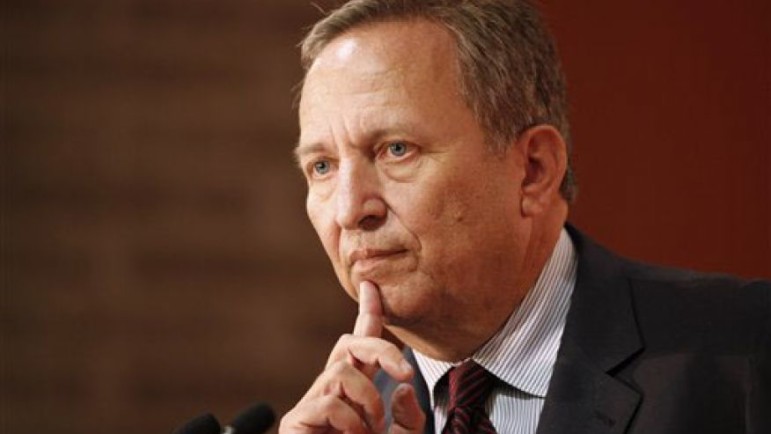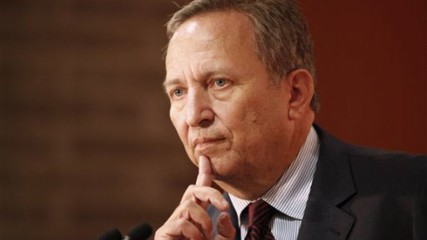Does religion have anything to say about how we deal with our wealth?
A good question.
Lawrence Summers — former U.S. Treasury Secretary, former president of Harvard — is way smart.
Look at some of the other items on his resume. Professor of economics at Harvard University. Chief Economist at the World Bank. Nominee for the chairman of the Federal Reserve.
Larry Summers has never been afraid of controversy. He got into it with Cornel West. He made some controversial remarks about women’s aptitude in math and science. The Harvard faculty gave him a vote of no confidence.
But the other day, the proverbial cat got Summers’ tongue.
It happened at the National Cathedral, during a symposium on “Capitalism and Morality: The Inequality Challenge.” Summers was on a panel with International Monetary Fund Managing Director Christine Lagarde and Adi Ignatius, the editor-in-chief of Harvard Business Review.
You can watch the whole exchange here.
Mr. Ignatius asked Lagarde and Summers about Christianity and wealth. He quoted Matthew 19:24: “It is easier for a camel to go through the eye of a needle than for someone who is rich to enter the kingdom of God.”
Ms. Lagarde responded by drawing on the Christian “parable of the talents,” which teaches about the use of personal resources. “It’s how you use it, what you do with it, and what purpose you give to your life as a result which really matters,” she said.
And then, it was Larry Summers’ turn to speak.
“I really don’t know what to say,” he said. “I’ve been on a lot of panels in my life–a lot of panels–and I have to say as a Jewish economics professor, this is the first occasion, and I frankly hope the last, on which I have been asked to opine on Christian morality.”
I have utmost respect for Larry Summers. His Jewish bonafides are beyond question. Summers has denounced the BDS (boycott, divestment, sanctions against Israel) movement.
Most famously, in 2002, Summers addressed the faculty and students at the University concerning the increasing rise in anti-semitism on campus.
But, at the symposium, when the conversation turned to faith( an appropriate subject for the National Cathedral(, Summers got a little flustered.
OK, you cannot offer your own interpretation of Matthew. No big deal.
But here is what saddened me: Larry Summers seemed to have had nothing Jewish to offer to the conversation. He seemed to have nothing Jewish to say about the meaning of wealth.
I am guessing (hoping, actually) that Larry Summers knows far more about Jewish views on economics than he let on.
But, in case he didn’t, we can discern in his muteness a sad and predictable pattern.
Many of the smartest Jews in the world have nothing to say about Judaism. They have no idea about what Judaism can contribute to a national conversation in the public square.
(And not just world-class intellectuals. I continue to be astonished about how some of the smartest, most capable Jews I know have stratospheric secular educational achievements, but when it comes to Judaism, they are still in the fifth grade.)
If Judaism is going to survive in the world, then it must have something to say about and to the world. Rabbi Alan Mittleman once wrote (and I quoted him in my book Being God’s Partner): “A renewal of Jewish life requires a fresh consideration of the connections between religion and public affairs. Judaism is a religion of the classroom, but it is also a religion of marketplaces, courts, and operating rooms.”
So, what could Summers have said?
Summers might have said that there are only 24 verses in the Torah about the animals that you are supposed to eat. But there are more than a hundred commandments in the Torah that address economics.
Summers might have said that from a religious point of view, wealth presents a challenge. (Read the books by Rabbi Meir Tamari, former chief economist of the Bank of Israel).
- How we get our money. Rabbi Abraham Joshua Heschel, who once rabbinical students about business ethics in Jewish law. Heschel told them: “You have become skilled at spotting blood in an egg. When there is blood in an egg, it becomes unkosher and unsuitable for eating. I hope you will be just as able to spot blood in money as well.”
- How we give our money. What kinds of causes and charities do we support? How much of our income do we give away?
- How we spend our money. What are our priorities? If you go through your credit card statements, they reveal what is most important to you.
- How we teach our children about money. Do we teach them, subtly, to be materialistic, or altruistic?
And finally, do we realize Who gave us all that wealth in the first place? Ultimately, it is God — a sense of which fosters within the individual the virtue of humility. We are not, in fact, “masters of the universe.”
An anonymous Baptist preacher once said: “A religion that ain’t good on Monday, ain’t good on Sunday.”
Or, on Saturday.
Religion is not only about ritual. It is about how our texts speak to the world.







